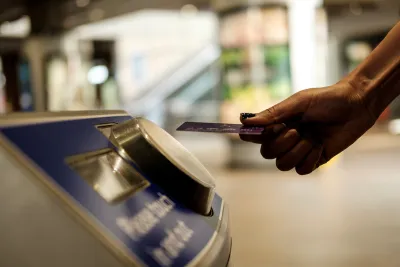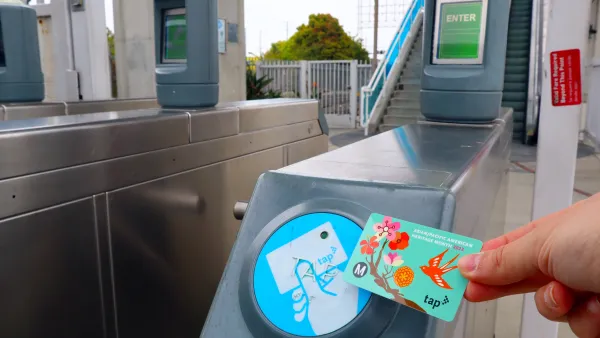Cashless fare options let agencies enable fare capping, track rider behavior, and eliminate proprietary fare cards.

In an article for GovTech, Skip Descant describes how cashless fare payment technology on public transit is changing the way transit agencies collect fares, enable fare capping, and speed up service.
According to Descant, “Fare-capping is often championed by transportation equity advocates as a way to corral runaway transit costs for low-income riders, since fares are capped at a certain amount for a set duration of time.” Technology now enables fare capping that wasn’t possible with cash payments. “But open loop systems can go beyond fare-capping to provide rich caches of data that officials can use to design incentives, loyalty programs and even routes,” Descant adds.
Newer fare payment systems also offer ‘open loop’ payments, meaning riders can use any debit or credit card to pay rather than a system-specific card. “New developments in areas like digital driver’s licenses could be made interoperable with digital fare payment systems to quickly and accurately validate data like age, disability or veteran status — all of which are often linked to transit discount programs.”
A 2022 study from the University of Oregon revealed a need for a cash payment option, however, noting that many of the people who depend on transit the most are still more likely to be unbanked.
FULL STORY: Tap-To-Pay Transit Tech Is Cash-Poor, but Rich in Data

Analysis: Cybertruck Fatality Rate Far Exceeds That of Ford Pinto
The Tesla Cybertruck was recalled seven times last year.

National Parks Layoffs Will Cause Communities to Lose Billions
Thousands of essential park workers were laid off this week, just before the busy spring break season.

Retro-silient?: America’s First “Eco-burb,” The Woodlands Turns 50
A master-planned community north of Houston offers lessons on green infrastructure and resilient design, but falls short of its founder’s lofty affordability and walkability goals.

Test News Post 1
This is a summary

Analysis: Cybertruck Fatality Rate Far Exceeds That of Ford Pinto
The Tesla Cybertruck was recalled seven times last year.

Test News Headline 46
Test for the image on the front page.
Urban Design for Planners 1: Software Tools
This six-course series explores essential urban design concepts using open source software and equips planners with the tools they need to participate fully in the urban design process.
Planning for Universal Design
Learn the tools for implementing Universal Design in planning regulations.
EMC Planning Group, Inc.
Planetizen
Planetizen
Mpact (formerly Rail~Volution)
Great Falls Development Authority, Inc.
HUDs Office of Policy Development and Research
NYU Wagner Graduate School of Public Service




























